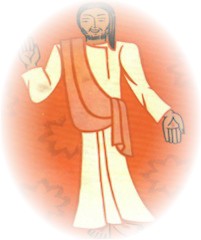| EASTER
SUNDAY |
|
| Celebrated on
:
The third day after Good Friday. |
|
| Religion :
Christian |
|
|
|
| Easter Sunday is the third day after Good
Friday. On this day the Resurrection of Jesus is celebrated. |
|
| Easter is the oldest of all Christian
festivals. It embodies the spirit of life for devotees, as they recall the
widely believed Christian legend of the resurrection of Christ. Easter honors
day and its brightness. It marks the transition from night to day, and from
death to life. A time for joy and happiness epitomizing new beginnings, it
rejoices at the spring harvest season. |
 |
|
|
| On Friday evening the dead body of Jesus was
taken down from the Cross and buried in a new sepulchre hewn out of the rock,
near mount Calvary, just outside the city of Jerusalem. |
|
| On Sunday early morning before dawn, the tomb
was found empty, although the big stone blocking the entrance had been sealed,
and guards had been posted there day and night by the authorities. |
|
Empty Tomb
The significance of the empty tomb was that the dead body of
Jesus could be found neither by His friends nor by His enemies. The enemies of
Jesus were obviously interested in disproving the Resurrection. This would have
been possible by recovering the dead body of Jesus, which allegedly had been
stolen by the disciples, and by publicly displaying it on that very day. This
would have been easy enough for the authorities, and would have proved decisive
to nip in the bud the "Resurrection myth". |
|
| The disciples too found the
tomb empty and had no idea about who could have taken the body of Jesus. But
more positively the Resurrection became a reality to them, when on the first
day, and in the course of the following 40 days, Jesus appeared to them several
times (seven apparitions are recorded in the Gospels) in different places, with
His living body for them to see and touch. The Faith in the Resurrection of
Jesus is based both on the empty tomb as well as on the apparitions. |
|
A Historical Truth and Faith
Meet
The Resurrection of Jesus is both a historical event and an
object of Faith. It is a historical event because the "disappearance" of the
body from the tomb took place in space and time, the two necessary co-ordinates
that make an event historical. On the other hand to the unbeliever the fact of
the empty tomb could not be explained except by saying that the body had been
stolen by the disciples while the guards were sleeping. The alternative
explanation was the Resurrection. |
|
| The apparitions were meant
to confirm the Faith of the believers. They were also historical events since
they all took place in definite places and times. Faith was needed to accept
the Resurrection because, although Jesus showed Himself to be truly alive, and
His body to be His real body, the same which had been nailed to the Cross, yet
the fact that He was not continuously present to the disciples, and would
appear and disappear, showed that Jesus was now in a new condition, that
transcended space and time, he had gone beyond history. |
|
| The Apostles who could be
taken to be an interested party in inventing the story of the Resurrection,
were actually slow in accepting it. They would only bow before the most
absolute and convincing evidence. This is particularly clear in the case of St
Thomas, who for one full week stubbornly refused to believe in the testimony of
the other ten Apostles. He only accepted the fact, when Jesus appeared again,
and urged Thomas to put his finger in the marks of the nails in His hands, and
to place his hand in the wound of His side, the conditions that Thomas himself
had laid down to believe, obviously thinking the whole idea to be an absolute
impossibility. |
|
The Apostles' Faith
The above considerations are essential to understand the
unique nature of the Faith of the Apostles. On the one hand it was Faith, a
gift of God, not given to other people who were also confronted with the
mystery of the empty tomb, Faith requiring an inner assent and surrender to
God's revelation, and on the other, it was an act of acceptance of a truly
historical event like any other. This twofold nature makes Faith in the
Resurrection of Jesus a true Faith, in contrast with faith in myths and
legends, which cannot be called true faith for lack of the historical truth. |
|
| Once the Faith in the
Resurrection of Jesus was firmly rooted in the minds of the Apostles, it
logically followed, not only that every word Jesus had spoken was true, but
also that all that the Old Testament had prophesied about him was equally true.
Jesus was truly the Son of God, His Resurrection and victory over death a
pledge of the life promised to those who would believe in Him. |
|
|
|
|
|